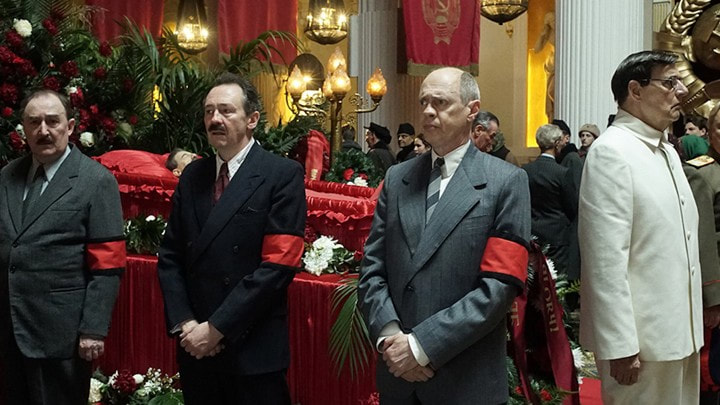In his desperate attempt to not be one of so many dead bodies, Consindine’s director executes the make-up performance to his satisfaction, and the tape is sent to Stalin’s dacha. Piano player Maria Yudina (Olga Kurylenko), furious at Stalin for her family’s disappearance, slips in an accusatory note with the tape, which Stalin reads later that night. He doesn’t get to give much of a reaction before he’s suffering a stroke within earshot of his guards, who don’t dare open the door on Uncle Joe’s bedroom. Found in the morning by his Politburo, the jockeying for position quickly begins. Party chief Nikita Khruschev (Steve Buscemi) looks to ally himself with the Red Army, deputy secretary Georgy Malenkov (Jeffrey Tambor) wastes time by mourning, and vicious NKVD chief Lavrentiy Beria (Simon Russell Beale) skillfully asserts himself and his ruthless organization as the new power. Every proclamation and directive becomes vital to staying alive, up to something as irrelevant as who stands where around Stalin’s casket.
The prologue with the concert and the brief amount of time spent with Stalin himself effectively demonstrates the deadening effect that bowing and scraping before this one man has had on the culture and the government. The Politburo has to laugh loud and long at his subpar jokes, flatter him, and remember to keep straight who retired at will and who was forcibly retired by a bullet in a dank basement. They know that they can easily be added to Beria’s lists, as Foreign Minister Molotov (Michael Palin) is after the group meets over dinner for the last time. McLoughlin’s best moment as Stalin comes right before he exits the film, wherein reading Yudina’s blistering condemnation, he simply laughs at such an ineffective and foolhardy gambit, the sacrificing of one’s life for no other reason than trying to shame a man who long past left it behind. He holds his subjects’ lives in his hands, until he coughs and sputters and relaxes his formerly-iron grip.
The political maneuvering in the wake of Stalin’s death kicks in immediately, and these machinations are well-suited for Ianucci’s brand of depuffing powerful figures. There’s nothing more humbling than a clumsy physical struggle, and he includes several. The entire Politburo struggles to move Stalin’s pee-soaked body to a bed instead of the indignity of the floor, and a later scene with Stalin’s inept son Vasily (Rupert Friend) features the best failed spitting ever committed to film. Beneath their clumsiness lies raw ambition, particularly on the parts of Khruschev and Beria. The best Malenkov can muster is pomp with no teeth, while true-believer Molotov is distracted by Beria’s release of his wife from prison, though that distraction is less about love than it is in reconciling how a person imprisoned for treason could possibly rejoin society. Both Khruschev and Beria utilize shady tactics against each other, and while Ianucci doesn’t shy away from depicting Beria as the monstrous serial rapist that he was, Khruschev doesn’t escape with clean hands, either.
The Death of Stalin is a dense film, packed with both historical incident and jokes, often at the same time. Small touches like the growing realization of the mess that Vasily has made of the national hockey team or the dearth of middle-aged doctors produce the rueful chuckles that dark comedy lives on. When Marshal Georgy Zhukov (Jason Isaacs) enters the scene, Ianucci needs to convey his larger-than-life status as the man who beat back the Nazi’s, and he does so with the ostentatious choice of having him grandly throw off his overcoat in slow-motion, his medals bouncing on his chest. Though actors like Friend, Buscemi, Isaacs, and Andrea Riseborough’s exhausted and marginalized daughter of Stalin all avail themselves of Ianucci’s rapid-fire dialogue, The Death of Stalin isn’t as funny as previous entries like Veep and In the Loop, though it feels more complex in the requirement that it conveys an abridged Soviet ethos over its runtime. That Ianucci can do that and still make a comedy amongst so much bleak history makes The Death of Stalin likely to live a long time. A-

 RSS Feed
RSS Feed